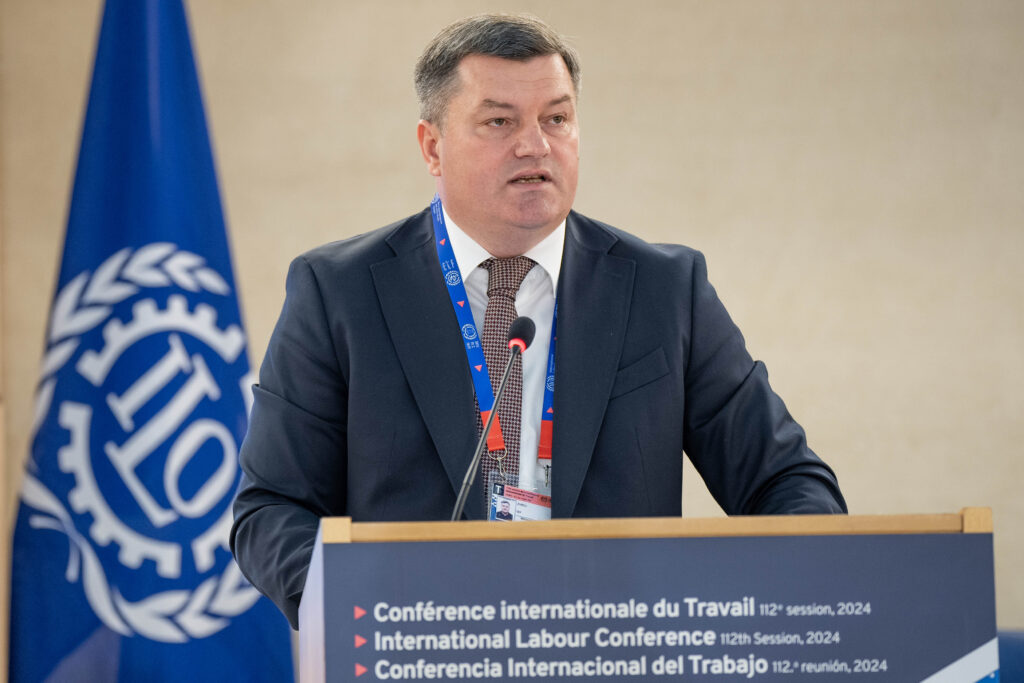A new meeting of the National Commission for Consultations and Collective Bargaining (CNCNC) was held today, 13 February 2025. The topics covered in the agenda : the mechanism for reviewing the minimum wage in relation to Directive 2022/2041; the remuneration policy for the work of employees in local authorities and institutions; the procedure for reporting to the NCCNC by the branch commissions; the concept of temporary work – Directive 2008/104/EC.
During the meeting, Sergiu Sainciuc, Vice-President of the National Trade Union Confederation of Moldova (CNSM), reiterated the Confederation’s position on the need to establish a functional mechanism for reviewing the minimum wage and presented the CNSM’s vision on this issue, as provided for in Directive 2022/2041.
As a reminder, according to the minutes of the CNCNC of 26.01.2024, agenda item no. 2 “On the mechanism for setting (compliance with) the minimum wage per country”, it was planned that the technical group responsible for the adequacy of the minimum wage would meet at least once every three weeks, with the aim of presenting the proposed mechanism by June 2024, which would set out the steps to be taken year by year for the next 3-4 years in order for the Republic of Moldova to comply with the provisions of the Directive, which was not realized.
In the context of these discussions, the representatives of the CNSM reiterated the need to set the minimum wage at 8050 lei as of 1 January 2026 in order to ensure the implementation of the EU Directive 2022/2041 on adequate minimum wages in the European Union. The increase in the minimum wage is necessary in the context of the energy crisis, which is causing an increase in the prices of products and goods, as well as in the tariffs for services.
With regard to the remuneration policy for the work of employees in local authorities and institutions, the CNSM notes some problems that require attention and solutions. The CNSM therefore draws attention to the following issues:
– the uneven increase in salaries (reference values), which leads to increased inequality and discrepancies in the appreciation of the work of civil servants with similar duties but in different areas of activity;
– The increase of the general reference value by only 100 lei from 2100 to 2200 (indexation only to CPI 4.6%), which does not provide motivation for civil servants in LPAs of levels I and II;
– Differences in salary grades and salary coefficients for level I and level II civil servants with similar duties, which leads to the migration of employees to better paid functions and creates a shortage of workers;
– the impossibility of covering the bonus for strengthening the managerial and professional capacity of the staff of executive civil servants from LPA revenues;
– recognizing and ensuring compliance with the provisions of collective labour agreements in the process of financial control, etc.
Vlad Canțîr, President of the Federation of Trade Unions of Public Service Employees of the Republic of Moldova SINDASP, drew attention to the shortcomings and inequalities affecting the interests of employees, trade union members in the field of public administration.
Representatives of the National Employers’ Confederation of the Republic of Moldova (CNPM) reported on the work of branch commissions, noting that it is laborious, complicated and does not produce the expected results, and that it is necessary to develop new approaches that would help strengthen social dialogue at the territorial level, namely amending Law 245/2006 on the organization and functioning of the National Commission for Consultations and Collective Bargaining, the commissions for consultation and collective bargaining at the branch and territorial levels.
The employers’ representatives also commented on the concept of temporary agency work, which refers to the work performed by a worker who has concluded a temporary employment contract with a temporary employment agency and is subsequently posted to work for another economic operator, in order to work temporarily under the supervision and direction of the latter. Temporary work makes it possible to supplement the staffing needs of economic operators during peak periods or to temporarily replace employees.
It should be recalled that the National Commission for Consultations and Collective Bargaining and the commissions set up at sectoral/territorial level are autonomous tripartite social partnership structures of public interest, which meet to consult and make proposals on labour and socio-economic issues of national, sectoral and territorial interest, to promote social partnership at all levels and to ensure the participation of civil society in the promotion of national policies.
The video broadcast with the interventions of all the participants at the meeting of the National Commission for Consultations and Collective Bargaining of 13 February 2025 can be viewed on the CNSM Facebook page.

